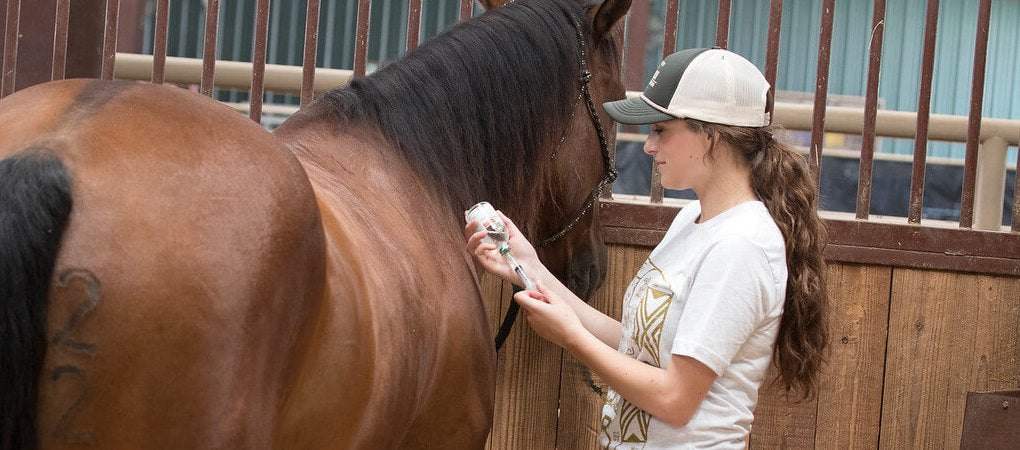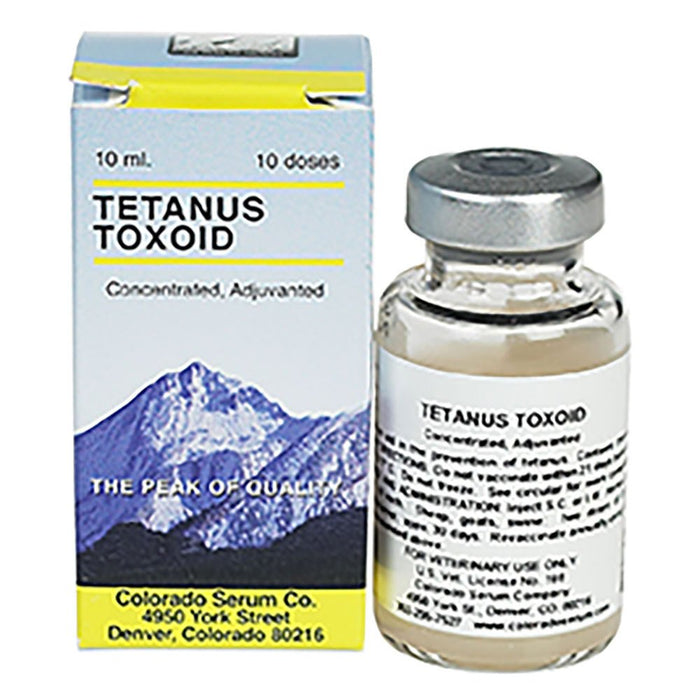
The Essentials of Horse Vaccinations
Here at NRS World, we know vaccines play a critical role in maintaining your horse’s health. Core diseases like West Nile, Eastern Equine Encephalomyelitis (EEE), and Western Equine Encephalomyelitis (WEE) are potentially fatal so it’s important to vaccinate your horse annually with core vaccines. However risk-based vaccines fight against diseases that your horse may encounter due to age, location, travel, and contact with other traveling horses. Risk-Based diseases include Equine Influenza (FLU), Strangles, and Equine Herpesvirus (Rhino). It’s important to note that FLU and Rhino are the leading infectious cause of death in horses because of how highly contagious they are and it’s recommended yearly for horses that encounter others. That being said when it comes to keeping our horses both happy and healthy, vaccinations are an essential piece to their well-being.

Did you know that here at NRS we offer a wide variety of vaccines that can cover all of your horse’s needs? Shop all Horse Vaccines
Q: Why are Horse Vaccines Important?
Disease Prevention: Vaccines help protect horses from various infectious diseases, some of which can be life-threatening or cause serious health issues. Vaccination is a crucial part of preventive healthcare for horses.
Herd Health: Vaccination not only protects individual horses but also contributes to the overall health of the equine population by reducing the spread of contagious diseases within a herd or community.
Cost Savings: Preventing diseases through vaccination is generally more cost-effective than treating them after they occur. Take it from me, vaccines are certainly easier on your wallet than vet bills!
Welfare: Vaccination plays a significant role in promoting the welfare of horses by reducing their susceptibility to infectious diseases, thereby enhancing their quality of life. What is it they say? Happy horse, happy life?
Horse vaccines protect against various diseases, including but not limited to:
-
Equine Influenza: A highly contagious respiratory disease.
-
Equine Herpesvirus (EHV): Several strains of EHV can cause respiratory disease, abortion, neonatal death, or neurological disorders.
-
Tetanus: A bacterial infection that can be fatal if a horse gets wounded or injured.
-
West Nile Virus: A mosquito-borne virus that can cause neurological disease.
-
Rabies: A fatal viral disease affecting the nervous system, transmissible to humans.
Please note that the specific vaccines required may vary based on factors such as geographic location, management practices, and individual horse risk factors. Horse owners need to work closely with their veterinarians to develop an appropriate vaccination program tailored to their horse's needs.
Core Diseases VS Risk-Based Diseases
‘Every horse in the United States is at risk of exposure to 5 potentially fatal core diseases: rabies, West Nile virus, Eastern equine encephalomyelitis (EEE), Western equine encephalomyelitis (WEE), and tetanus. This risk arises because the carriers of these diseases—mosquitoes, wildlife, and soil bacteria— are commonly present in horses’ daily environments.’ (Zoetis)

Signs of West Nile, EEE & WEE:
West Nile - Stumbling. Staggering. Wobbly Gait. Circling. Hind Limb Weakness. Inability to Stand. Limb Paralysis. Teeth Grinding. Fever.
EEE - Fever. Lack of Appetite. Circling. Pressing Head in Corners. Blindness. Staggering. Wobbly Gait. Seizures.
WEE - Fever. Severe Depression (Sleeping Sickness). Blindness. Muscle Twitches. Circling. Head Pressing. Ability to Swallow. Paralysis.
Respiratory ailments stand out as the primary infectious cause of mortality among horses, with equine influenza (flu) and equine herpesvirus (rhino) being the top respiratory illnesses. The probability of a horse contracting a risk-based ailment is affected by factors such as age, surroundings, and lifestyle. To guarantee your horse's well-being, seek advice from your veterinarian regarding their suggestions on risk-based vaccinations and the frequency of vaccination tailored specifically to your horse's individual requirements.

Signs of FLU, Rhino & Strangles:
FLU - Fever. Nasal Discharge. Cough. Loss of Appetite. Weakness. Lethargy.
Rhino - Fever. Nasal Discharge. Throat Inflammation. Cough. Poor Appetite. Enlarged Lymph Nodes. Depression.
Strangles - Fever. Nasal Discharge. Cough. Swollen Lymph Nodes. Drainage. Swollen Lymph Nodes. Depression. Loss of Appetite.
Q: How Often Does My Horse Need to Be Vaccinated?
Well, that depends! Vaccination regiments vary based on your horse’s age, health, environment, and local disease risks. In my experience, most horses require vaccinations once or twice a year, although some vaccines may need more frequent administration.
For core vaccines, such as those protecting against diseases like tetanus and rabies, an annual booster shot is typically recommended to maintain immunity. Other vaccines, such as those for equine influenza and equine herpesvirus, may require more frequent boosters, often every six months, especially for horses that travel frequently or are regularly exposed to new horses.

Vaccination Tips
Vaccinate at least 2-4 weeks before travel! This ensures optimal protection against infectious diseases when traveling and coming in contact with other horses.
Maintain 6-month vaccination records. Records of equine influenza virus and equine herpesvirus vaccinations within the past 6 months are required by USEF rules for any equine competitors. It’s always important to keep a copy of your horse’s transportation paperwork (Coggins).
Q: What Type of Vaccines Does My Horse Need?
Several core vaccines are generally recommended for most horses:
Tetanus: This bacterium is present in soil and can enter the body through wounds or punctures, causing a potentially fatal condition known as tetanus. Vaccination is crucial to prevent this. Tetanus Toxoid is a great safe option for cattle, horses, sheep, goats, and swine against Tetanus.
Rabies: Rabies is a viral disease that affects the nervous system and is transmitted through the bite of an infected animal. Vaccination against rabies is not only important for your horse's health but also for public health, as rabies is zoonotic (transmissible to humans). Must be administered by a licensed veterinarian.
Eastern/Western Equine Encephalomyelitis (EEE/WEE): These are viral diseases transmitted by mosquitoes that can cause inflammation of the brain and spinal cord. Vaccination helps protect horses from these serious illnesses. A vaccine like Merck Prestige 5 + West Nile vaccinates against EEE/WEE, Equine Influenza, EHV-1, EHV-4, Tetanus, and West Nile for 6 months!
West Nile Virus (WNV): Another mosquito-borne disease, WNV can cause neurological problems and can be fatal in horses. You’ll need the Zoetis West Nile Innovator - it’s also the only West Nile virus vaccine adjuvanted with MetaStim for improved immune response.
Shop all Horse Vaccines
In addition to these core vaccines, your veterinarian may recommend other vaccines based on your horse's individual circumstances. These may include vaccines for:
Equine Influenza (EIV) The Zoetis Flu Innovator EHV-4/1 protects against respiratory forms of Rhino and influenza.
Equine Herpesvirus (EHV) Zoetis Fluvac Innovator 5 not only fights off Rhino but protects against EEE, WEE, EIV-1, EIV-4, and Tetanus.
Strangles (Streptococcus EQUI) You’ll want the Zoetis Pinnacle Intranasal Vaccine. An intranasal vaccine that aids in the prevention of strangles caused by Streptococcus equi in healthy horses. Administer 1 dose into one nostril. Repeat in 2 to 3 weeks. Revaccinate annually with a single dose. Pinnacle I.N. contains live culture and requires mixing. Includes nasal applicator tips.
Q: How Do I Administer Horse Vaccines?
First and foremost, when administering any vaccines to your horse, consult with your veterinarian. They can advise you on the appropriate vaccines for your horse's specific needs, as well as the correct dosage and administration technique. Administering horse vaccines requires careful handling and proper technique.
Step 1: Gather your supplies! My supply kit includes the vaccines themselves, syringes, needles, alcohol tabs, and gloves.
Step 2: Prep your vaccines by following the manufacturer's instructions for preparing the vaccines. Some vaccines may require reconstitution with a diluent, while others may come ready to use.
Step 3: Choose your horse’s injection site. Vaccines are typically administered via intramuscular (IM) injection in the neck muscle or upper buttocks. Choose a clean and well-defined injection site, you’ll want to avoid areas with major blood vessels, nerves, or bony prominences.
Step 4: Disinfect the injection site with the alcohol swab to reduce the risk of infection or contamination. Using a sterile syringe and needle, draw up the appropriate dose of the vaccine, ensuring that no air bubbles are present in the syringe.
Step 5: Insert the needle into the chosen injection site at a 45- to 90-degree angle, depending on the size of the horse and the length of the needle. Administer the vaccine slowly and steadily, ensuring that the entire dose is delivered. When removing the needle from the injection site apply gentle pressure to the area to minimize bleeding.
Shop all Vaccination Supplies
Dispose of any used needles and syringes properly in a puncture-proof container according to local regulations. After vaccinating it’s best to always monitor your horse for any signs of adverse reactions, such as swelling, pain, or fever. Contact your veterinarian immediately if you notice any concerning symptoms. If you're unsure about how to administer vaccines safely and effectively, it's best to seek guidance from your veterinarian.
Understanding the importance of vaccination frequency and the types of vaccines your horse needs is essential for every responsible horse owner. Whether it's core vaccines to defend against common threats or risk-based vaccines tailored to your horse's specific circumstances, staying proactive in vaccination is key to keep horse safe and healthy.
Remember, when it comes to your horse's health, prevention is always better than cure. So, make sure to consult with your veterinarian and stay up-to-date with vaccination schedules. Here at NRS we want to help you prioritize your horse’s well-being and set them up to thrive for years to come!









